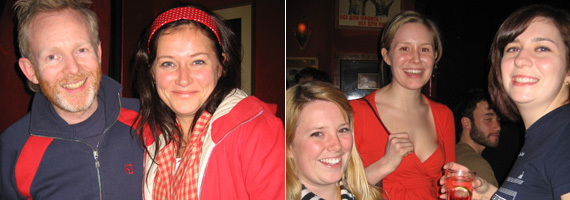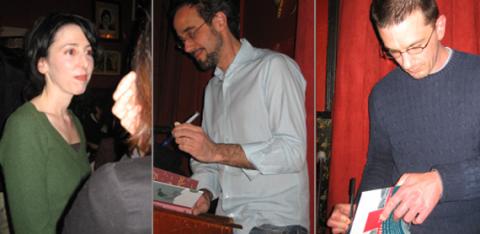3.18.07: McSweeney's Night
McSweeney Night, March 18th: The KGB crowd was wall-to-wall in honor of the latest installment of the Sunday night Reading Series. First up was Deb Olin Unferth reading from her latest short story collection, Minor Robberies. Her rhythmic sentences and linguistic playfulness were a pleasure. Next was Paul LaFarge reading from an untitled work-in-progress. He had the room rolling with his incisive, comedic riffs on life in an all-boys high school. Chris Adrian rounded the group out with some touching material that didn't make it into his latest novel, The Children's Hospital, but worked nicely as an independent sample. After the room thinned out I had the privilege of speaking with all three.
Deb Olin Unferth's work has appeared in Harper's, Conjunctions, NOON, Fence, the Pushcart Prize anthologies, and elsewhere. Minor Robberies, a selection of her stories, will appear as one volume of three from McSweeney's."Rarely has panicked humanity been rendered with such mastery of feeling and finish within the close quarters of the short-short story. Minor Robberies is a sorrowingly comic debut of seductive perfections, courageous range, gracing wisdom. Deb Olin Unferth achieves sublimities with a lightness of touch and a sureness of form that mark her as an original, a natural-a new force to be heeded and esteemed."
--Gary Lutz
Interview with Deb Olin Unferth
KGB: When is your story collection, Minor Robberies, due for publication?
DOU: July.
KGB: Are you working on anything new?
DOU: I'm finishing a novel.
KGB: Does it have a title?
DOU: Everything Else About Gray.
KGB: There seems to be an playfulness with language in Minor Robberies, a dark humor, but also an emphasis on the naming of things, the unpacking of the named thing… could you say something about how you generate your stories?
DOU: Thank you for reading my stories so carefully, that's really wonderful…
(KGB blushes)
I'd say my stories usually start with something I can hear, a rhythm, and I try to replicate that rhythm onto the page, in some way, and usually it's through wordplay.
KGB: Anything you'd like to add?
DOU: (Laughs) The collection Minor Robberies is coming out as three books of short stories all housed in one box. One by Dave Eggers, one by me, and one by Sarah Manguso, all in a box.
KGB: That sounds really cool.
DOU: Yeah.

Paul La Farge is the author of two novels, The Artist of the Missing (FSG, 1999) and Haussmann, or the Distinction (FSG, 2001). His stories have appeared in Conjunctions, Fence, McSweeney's, and STORY. He won the Bard Fiction Prize in 2005.
KGB: You read tonight from an untitled work-in-progress, a novel. The section you read takes place in an all-boys private school in New York City. Are you drawing on personal experience there?
PL: Yes.
KGB: From when you were a student?
PL: Yeah.
KGB: Mr. Savage, the teacher in your piece, says, "If you try hard enough to tell a good story you'll get to the truth." Is that advice you would give a student of fiction?
PL: It's not the sort of thing I would tell a student of fiction, but it is where the book is going. Truth is a complicated thing. The book is trying to get at the idea that if you tell a story well, you get something useful out of it. I don't know if that's the same as truth.
KGB: Any idea when the book will be done?
PL: (Laughs) No, I keep thinking that I'm finished with the book and keep finding out that I'm not, so I'm wary of making more predictions about when I'll be done, but hopefully… I will finish it.
Chris Adrian has written two novels, Gob's Grief and The Children's Hospital. His short fiction has appeared in The Paris Review, Zoetrope, Ploughshares, McSweeney's, The New Yorker, The Best American Short Stories, and STORY. He recently completed a pediatric residency at the University of California and is currently a student at Harvard Divinity School.
KGB: Your novel, The Children's Hospital, takes place in a children's hospital floating in the middle of the ocean… how did a children's hospital come to be floating in the middle of the ocean?
CA: (Laughs) The idea is that there's been a second flood, and the whole earth is under seven miles of water, and the only people who survived were people who happened to be either patients or parents or people who were working in the hospital at two a.m. when the flood happens, and it turns out that the hospital was designed by an architect who got visits from an Angel as he was designing the building, telling him that the second flood was coming and he had to basically make a new ark, and so after the rain starts the hospital basically unmoors from its foundation and floats away.
KGB: You're a pediatrician, and are currently pursuing a degree at Harvard Divinity School.
CA: Yes.
KGB: And you just published a novel.
CA: Yes.
KGB: That's really impressive.
CA: (Laughs) Thank you.
KGB: Could you say something about in what way your various pursuits influence your writing, if that isn't too broad a topic?
CA: Medicine and writing overlap a bit, mostly because as a physician I experience things that definitely come out in the writing, even if I'm not writing about a hospital or a sick kid or anything that has to do with medicine, and the privilege of seeing people in these extraordinary situations kind of manufactures the pressure to write in a way that I don't exactly understand. The divinity stuff is more academic. I find it interesting, and a lot of what I'd been reading while writing The Children's Hospital overlapped with the reading list for the first year at Divinity School, so that was part of what attracted me to enroll.
KGB: Are you working on anything new?
CA: Yeah, I'm putting together a collection of stories. They're mostly already written, I'm just fixing them up, and the collection should come out not this summer but the following.
